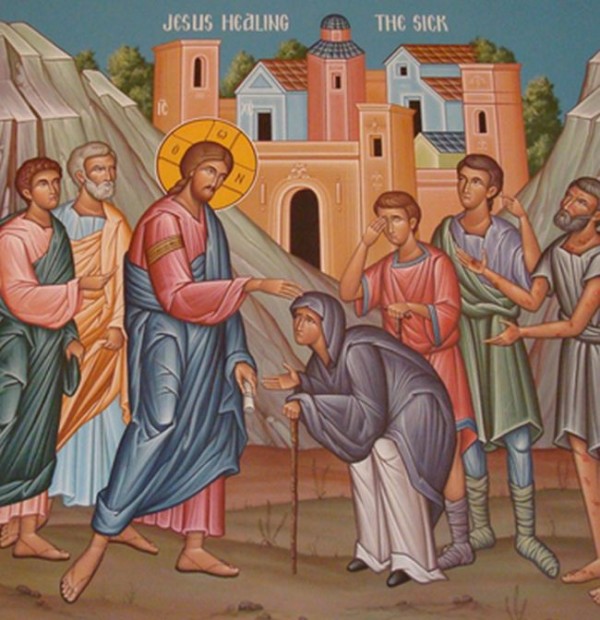In the name of the Father, and of the Son, and of the Holy Spirit, one God, Amen.
Darkness surrounds my soul and I am weighed down by my iniquities and am overcome. And I cry out to God,
O Lord, do not remove Your compassion from me;
May Your mercy and Your Truth take hold of me continually.
For evils without number surround me;
My transgressions overpower me, and I could not see;
They multiplied more than the hairs of my head.
— Psalm 39:12–13 ʟxx
And not being able to see nor to look up, I am bowed down to face the earth from which I was made and to which I shall return. I long to look up to the high places, to the temples and powers of this age, seeking after healing: yet none of these can offer what I need for my life, freedom from the sin. They would just give me a little more strength to carry more sin but they do not deal with the problem: eventually the extra sin would bow me again to the earth, to death. I need not a helper from the mountains but from Heaven.
“I lifted my eyes to the mountains,” says the Psalmist, seeing the pagan high places and temples as he journeys to the Holy City. He goes on to pose, then answer, a question.

From where shall my help come?
My help comes from the Lord,
Who made heaven and earth. …
The Lord shall keep you from all evil;
The Lord shall keep your soul.
— Psalm 120:1–2, 7 ʟxx
And the Lord comes before me: he does not give me the strength to carry the sin but removes from me the sin entirely, “you are freed from your infirmity,” which is to say, “you are freed from the powers of sin and of this age.” And I am straightened and I stand tall.
But how do I treat my new-found freedom. To be free does not mean to do whatever we want—to be swayed by each emotion, to chase every idea, to follow all impulses wherever they lead—such behaviour would be a return to the slavery of sin. To be free, to stand upright, is to choose to bear our crosses and follow Christ. I am free when I choose to serve, because to be free is to make alive the image of God within us, to be like Christ who “did not come to be served, but to serve, and to give His life a ransom for many.” (Matthew 20:28)
Let us, therefore, my dear brothers and sisters in Christ,
not trust in princes nor in the sons of men,
In whom there is no salvation.
— Psalm 145:3 ʟxx
But place our hope in the Lord who delivers us, His people, from being weighed down with sin so that we may rise and lift our eyes to the One to Whom we are faithful.
To our crucified and risen God and Saviour Jesus Christ, Who has given us the freedom to follow Him, be all glory, honour and worship, together with His unoriginate Father and the All-holy, Good and Life-giving Spirit. Amen.
Brethren, Christ is our peace, who has made us both one, and has broken down the dividing wall of hostility, by abolishing in his flesh the law of commandments and ordinances, that he might create in himself one new man in place of the two, so making peace, and might reconcile us both to God in one body through the cross, thereby bringing the hostility to an end. And he came and preached peace to you who were far off and peace to those who were near; for through him we both have access in one Spirit to the Father. So then you are no longer strangers and sojourners, but you are fellow citizens with the saints and members of the household of God, built upon the foundation of the apostles and prophets, Christ Jesus himself being the cornerstone, in whom the whole structure is joined together and grows into a holy temple in the Lord; in whom you also are built into it for a dwelling place of God in the Spirit.
— Ephesians 2:14–22
At that time, Jesus was teaching in one of the synagogues on the sabbath. And there was a woman who had a spirit of infirmity for eighteen years; she was bent over and could not fully straighten herself. And when Jesus saw her, he called her and said to her, “Woman, you are freed from your infirmity.” And he laid his hands upon her, and immediately she was made straight, and she praised God. But the ruler of the synagogue, indignant because Jesus had healed on the sabbath, said to the people, “There are six days on which work ought to be done; come on those days and be healed, and not on the sabbath day.” Then the Lord answered him, “You hypocrites! Does not each of you on the sabbath untie his ox or his donkey from the manger, and lead it away to water it? And ought not this woman, a daughter of Abraham whom Satan bound for eighteen years, be loosed from this bond on the sabbath day?” As he said this, all his adversaries were put to shame; and all the people rejoiced at all the glorious things that were done by him.
— Luke 13:10–17
